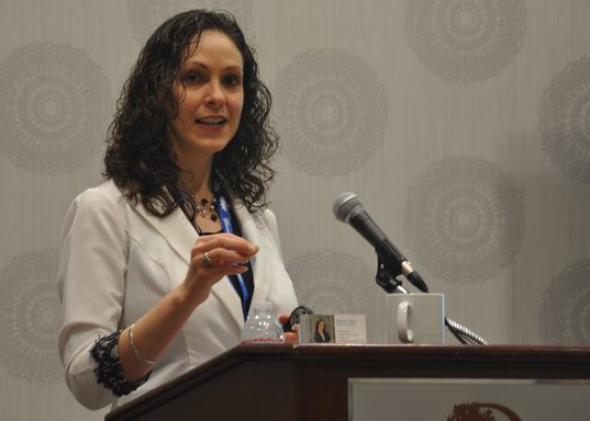If you’re a young woman, you’ve probably been told there’s something wrong with your voice.
It seems like there are always new features of women’s speech that need to be corrected, be it uptalk, vocal fry, higher pitch, swoopy intonation (believe it or not, that’s the technical linguistic term), using discourse markers like “like,” or simply speaking too much. One woman even made a movie just to tell young women all the things they should change about their voices.
And I’ve been told the same thing. Last week, I gave an interview on NPR, and while most of the reactions were overwhelmingly positive, I also received several messages suggesting I change my voice so that people will take me seriously. Why? Well, I uptalk. But I’m not ashamed of it, and no one else should be either.
Uptalk, in case you’ve missed several years of media frenzy, is using a rising intonation at the end of a phrase or sentence. What’s the matter with that? Well, that rising intonation is similar (although not identical) to how any English speaker sounds when asking a question, so to some people it sounds as if uptalkers are speaking only in questions, and are thus not very confident.
Or so they tell young women. But the funny thing is, uptalk isn’t actually just used by the young and female. When you’re on the lookout for it, you’ll hear uptalk from people of many demographics. Yet I’ve never heard anyone condemn New Zealanders’ speech for not being authoritative or confident enough, despite their rampant use of uptalk at all ages and genders. I also hear many men, including former President George W. Bush, using uptalk, and have yet to hear any of them be chastised for not sounding authoritative enough. In fact, there’s no conclusive evidence that women even use uptalk more than men.
But even if women did uptalk more than men, we’ve all heard enough uptalk to know that its rising intonation doesn’t indicate a question. No one’s actually confused. So why should anyone have a problem with it? The thing is, this pastime of critiquing women’s speech is not limited to American English speakers. It’s easy to find these attitudes in any culture that devalues femininity and women. In Belfast English, stereotypical women’s speech falls at the end of a sentence, while men’s speech rises before it plateaus—basically, the men are uptalking. And yet Belfast women’s speech is still perceived as more expressive or emotional, showing that it’s not about their actual intonation at all: It’s about whose mouth the speech is coming from. (In fact, vocal fry leads to a lower-pitched voice, essentially the opposite of uptalk, and yet somehow that’s bad when young women do it too.)
And that’s definitely not the only study, and it’s not just gender. It’s race, it’s class, it’s sexuality, it’s geographic location, it’s many other factors. But linguists have never been able to show anything intrinsically good or bad, authoritative or unconfident, desirable or grating about any kind of pitch, inflection, or vocal quality. Instead, we ascribe those qualities to speech based on who’s articulating it. Think Black English sounds uneducated? That’s probably because you have some racist notions about black people. Does a Southern accent sound unintelligent to you? Their vowels aren’t to blame—it’s our stereotypes about people from the South. Think that uptalk makes women sound less authoritative? Maybe that’s because women are constantly robbed of agency and authority, and we view anything they do or say as less powerful.
The thing is, I actually believe that the people—mainly women, actually—who were messaging me about my uptalk sincerely wanted to help me reach a wider (read: male) audience. Some listeners said my rising intonation made me sound unsure of my information, others said my voice distracted listeners from my insights, still others said that I sounded too emotional and unconfident. I even had one older woman claiming to be an “English communication expert” offer to give me free vocal coaching.
And I get it. I owe a lot to these women who came before me, and I understand that they may not have had much choice in the matter when they were my age. After all, employers admit to actively punishing workers who use uptalk, and many women, especially women of color, simply can’t afford not to change their voice in order to gain respect. But just because sexism exists doesn’t mean that the sexists are right about it: Women shouldn’t have to wear pantsuits to be treated like human beings, and we shouldn’t have to contort our voices to sound masculine (but not too masculine!) to make people hear us.
I really do appreciate these listeners’ concerns, but the notion that my uptalk means I was unsure of what I said is not only wrong, it’s misogynistic. It implies that if women just spoke like men, our ideas would be valuable. If women just spoke like men, sexist listeners would magically understand us, and we would be taken seriously. But the problem is not with feminized qualities, of speech or otherwise, the problem is that our culture pathologizes feminine traits as something to be ashamed of or apologize for.
I believe we can do better than that. We can evaluate the merits of an idea based on the soundness of its reasoning, not the pitch range in which it’s articulated. We can reject the knee-jerk habit of dismissing people for the sound of their voices without actually hearing what they have to say. And—rather than telling women to talk like men or shut up—we can encourage each other to celebrate the different rises and falls, the creaks and quakes that make up our voices.
Follow @lexiconvalley on Twitter and on Facebook.
